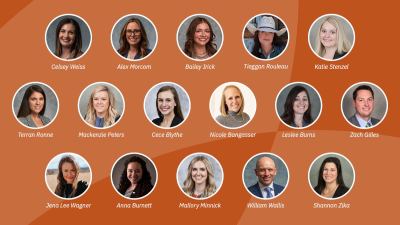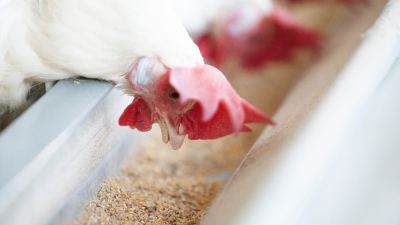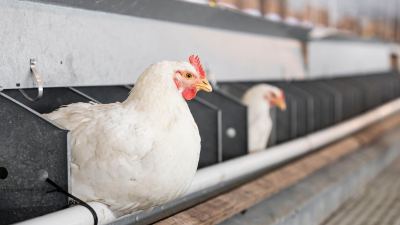Guido Crolla – Debunking the Misperceptions of Aquaculture

In the most recent assessment by the United Nations Food and Agriculture Organization, it was calculated that 2/3 of the fish stocks were being harvested in a sustainable manner.
Alltech Coppens recently published its sustainability report, which focuses the responsible use of the earth's resources within aquaculture as the sector works to support the global food supply. Guido Crolla, procurement manager with Alltech Coppens, discusses the ambitious goals outlined in the report and highlights the industry achievements that counter the negative portrayals of aquaculture.
The following is an edited transcript of the Ag Future podcast episode with Guido Crolla hosted by Tom Martin. Click below to hear the full audio or listen to the episode on Apple Podcasts or Spotify.
Tom: I’m Tom Martin and joining me is Guido Crolla, manager of procurement with Alltech Coppens. A global specialist in developing, producing, and marketing fish feed and nutrition solutions, Mr. Crolla took the lead in producing a report detailing the company's commitment to sustainability. And he joins us now to talk about it. Greetings, Guido.
Guido: Hello, Tom.
Tom: So, Alltech has committed to 9 of the United Nations’ 17 sustainable development goals. Let's begin by having you tell us how, as a subsidiary of Alltech, Coppens is working to support that commitment.
Guido: Well, Alltech did a great job by committing themselves to the United Nations Global Compact on July 2019 and went to creation of a Planet of Plenty vision. And then as a subsidiary, this gives us a lot of possibilities and opportunities as well. So, one of the SDGs Alltech committed themselves to was SDG #14, life below water. And this SDG fits perfectly with us with Alltech Coppens. So, daily job is based on the life below water. We believe that we all have a contribution to achieve a better world and to create more awareness on the SDGs. So, within Alltech Coppens, we created our own sustainability team. We called it a Planet of Plenty team. And this theme consists out of 7 members from different departments. And this gave us the opportunity and the possibility to raise more awareness within the complete company in a short period of time as most disciplines are involved in the team. And in addition, we are now in contact with the people of the Planet of Plenty team in the States and with colleagues from all over the world who are focusing on sustainability as well. We, within Alltech Coppens, we believe that communication and knowledge sharing is the key to achieve the vision of a Planet and Plenty. And you will hear several times during this podcast I think that we can only achieve a Planet of Plenty when we work closely together, Tom.
Tom: How is Alltech Coppens researching, developing, and putting into practice better alternatives to the way the fish industry has been going about its business?
Guido: So, the Alltech Coppens R&D and procurement departments evaluate all the raw materials which we’re using on aquaculture products. And so, we ensure that they are sustainable source and responsible and ultimately benefit farm performance in the future of our industry and planet. So, different feeds are characterized according to its impact on different sectors such as climate change, acidification, etc. So, by assessing how much feeds we produce, how much of each raw material or ingredient we use in each feeds and the geographical location of our suppliers, we can evaluate the raw materials. We are determined to contribute to the United Nation SDGs and evaluate the origin of the raw materials. So, last year, 80% of the raw materials that we sourced were produced within Europe. 20% came from Germany where our factory is standing. 60% came from the Netherlands where we have our head office. And we expect that those numbers will slowly increase this year and the year after. So, nowadays, fish feed quality is not only determined by parameters directly related to the fish like the performance, but there is also a focus on the effect of the feed on the planet. So, we conduct a lot of trials on alternative raw materials like insect meal, a single-cell protein. So, we are constantly sourcing new alternative raw materials with a sole focus on lowering the impact the feed has on the environment.
Tom: So, I take it from what you just said that you are working with other companies in other parts of the world to improve sustainability in aquaculture?
Guido: Indeed, Tom. If you want to achieve a sustainable world and a Planet of Plenty, we have to work together. So, we work closely together with local partner factories to produce efficiently and at the same time to minimize adverse effect on the environment. With sharing our knowledge and experience, we want to provide the local communities with better feeds and to lower the feed conversion ratio. By doing so, we’re not only providing the local communities with more food and better food, but we are decreasing the usage of raw materials too, so a win on both sides.
Tom: How is sustainability embedded in the Coppens business strategy and what are the ambitions and goals of that strategy?
Guido: So, within Alltech Coppens, we are inspired by the great challenge the world has presented us to produce enough safe, nutritious food for all while caring for our animals and sustaining our land, air, and water for future generations. A Planet of Plenty vision is a vision of promise, possibility, and positivity for the future.
It’s a belief that the world of abundance is achievable and it will take all of us to work together. Within Alltech Coppens, we focus our attention on 3 main areas. The first one is sustainable operations. The second one is science and innovation. And the third is people and communities. If you visit our website, alltechcoppens.com, you will find our examples on our sustainability is embedded within our business going from sustainable feed index, reusing water, creating an Alltech Coppens Academy circle of waste management and a lot more. And on the longer term, we have set ourselves the goal to be carbon neutral at the Alltech Coppens Aqua Centre by 2025. So, within 3-1/2 years, to expand renewable energy, and to use only renewable energy by 2030, and to realize zero waste emissions by recycling and reusing materials throughout the complete life cycle of our fish feeds by 2030.
Tom: It might seem obvious, but maybe not. Why should sustainability— Why should the long term be viewed as a business issue?
Guido: To simply put it, sustainability is a business approach that’s creates a long-term failure by taking into consideration our business approach in ecological, social as well as the economic environment. So, as the expectations of corporate responsibility increase and as transparency becomes more prevalent, companies are recognizing the need to echo sustainability. So, professional communication and good intentions are no longer enough. To sum it up, sustainability is a major challenge. One that met us beyond individual companies as we all want a long lasting, viable business. And we can only achieve this by embedding sustainability within the core of our business.
Tom: There's a section in the sustainability report that you oversaw on materiality and supplier assessments. And we hear a lot these days about very serious supply chain issues. Are there these sorts of problems within the aquaculture industry?
Guido: Yeah. Unfortunately, there are. So, we face the same struggles and challenges as most other major industries. We have governments interfering with export and import taxes. There are trade wars, strikes, extreme weather situations. Then we had COVID-19. Complex global logistic situation and so on. And the hardest part here is that our customers and their animals are relying on us as a feed specialist. We can't afford any delays of a week or longer. Even a day might be critical. And therefore, at Alltech Coppens, we are constantly monitoring everything and everyone around us to anticipate in the best possible way.
Tom: There’s a documentary out there. It debuted in March on Netflix. Seaspiracy is the title. And it stirred up a lot of controversy. A lot of celebrities praising it as “a brilliant expose of fishing is the greatest threat to marine life”, but NGOs, sustainability labels, and some of the experts quoted in the documentary have accused the filmmakers of making misleading claims using out of context interviews and erroneous statistics. Where do you come down on this matter?
Guido: Yeah. Tom, I think we all agree that it’s a message of the ecological harm of industry of fishers. It’s a major irritant issue. But to be fair, we need to present facts, not fiction, and unite. Build consensus and use rational arguments to convince people to change. The convenient oversight of not including the many, many success stories of good management, that's why science communities provides an extremist view of this issue.
Tom: Guido, what in your mind are some of the more serious misperceptions that are advanced by this film?
Guido: The biggest error is to say that sustainability fisheries don’t exist. As we all know, food production systems have an impact on the natural world. Obviously, some more than others are aware that sustainable fisheries do exist. In the most recent assessment by the United Nations Food and Agriculture Organization, it was calculated that almost 2/3 of the fish stocks were being harvested in a sustainable manner. Around 66%. And that 78% of all landings of marine fisheries came from biological sustainable stocks. That’s completely different fact than Seaspiracy is showing us.
Tom: Well, the head of the International Marine Mammal Projects says Seaspiracy did a disservice to organizations that are doing critical work to protect oceans and marine life. Is that true?
Guido: Indeed, the movie needed to be much more scientifically accurate. So, many of the statements made were based on outdated studies and links were often made where they don’t exist. These errors make it very easy for decision makers like a government to ignore the message in the film. Seaspiracy had the lack of diversity of views too. Almost all the interviewees were white and from the western world. We need to do it from a range of ethnicities and cultures. We need to do it from the seafood industry, from managers, from NGOs, from the local society in Africa or Asia. There’s almost no fishery scientists were interviewed for the film as well, which is in my opinion a major omission in the film about overfishing.
Tom: The documentary’s director, Ali Tabrizi, asserts that fisheries are in severe decline. Is that true?
Guido: Overfishing is a problem, but we know sustainable fisheries are possible. If we turned entirely to the that it would complicate from the sea, environmental impact on land will be catastrophic and much more visible to humans. In terms of carbon footprints, well-managed fisheries and aquaculture systems actually have a much lower impact than many other food production systems. So, aquaculture currently provides about half of all the fish or seafood in the world. And we need to figure out how to expand aquaculture to feed the growing global population. Even with improved fishery management, we are unlikely to be able to sustain a much more sea-free fishery, so aquaculture is the future here.
Tom: Well, this documentary makes one very stark— I would even say breathtaking prediction. Quoting from a 2006 study that the ocean will be empty by 2048, empty 27 years from now, is fishery’s depletion actually on such a path? Are we headed toward that?
Guido: Yeah. This is some wrong information that they’ve used as well. This claim was originally made in a scientific paper in 2006 by Boris Worm. And the funny thing is in the follow-up paper in 2009, 3 years later, he co-wrote that it was found that in certain areas which limit the fishing, the stock heads were caught already. When you actually look at the data this research was based on, it was based on massive extrapolation into the future. It was a study that was questionable to begin win. A more recent study in 2016 reported by the National Academy of Science of the United States predicted that over 50% of the fish stocks would be sustainable by 2050. And overfishing is certainly a problem in some regions in the world. Even regions where fishing management regulations are based on scientific evidence and properly enforced, most fish stocks are doing well.
Tom: What can you say given all of that information that is being put out there through the documentary for example? What can you say to us to reassure people that the industry is committed to sustainability?
Guido: Well, when we take a look at let's say farmed shellfish like oysters, mussels, and scallops for example, they are some of our more sustainable food options. And you think why because they don't require any additional feedings and they tend to grow their nutrition directly from the ocean current in which they are grown. And in this way, they create an incredibly direct link from sunshine to highly nutritious animal proteins via plants in the form of plankton. And in some cases, farming shellfish actually reduced pollution and improves water quality. For example, a fertilizer runoff from land-based farming is a common water pollutant, but shellfish has the ability to filter this from the water. They convert it into food. And this also has the added benefit of reducing the likelihood of toxic algal blooms in the area where shellfish farming occurs. And if we go a bit deeper, we see that the global fish in/fish out factor also called the FIFO in our industry is 0.27, which means that we need 270 g of wild-caught fish to produce 1 kg of farmed fish. And this FIFO factor is calculated by defining the fish caught that is used for aquaculture feed production by the farmed fish heads with those feeds. So, if we do the same for Alltech Coppens, we have a FIFO factor of 0.10, which means that we need 100 g of wild fish to produce 1 kg of farmed fish.
Sounds quite sustainable for me. We need 1 kg of fish to gain 10 kg of new fish. And in addition, the greenhouse gas emission of farmed fish are significantly lower than some of our daily used product. Did you know, Tom, that coffee and chocolate have greenhouse gas emission that are 3 or 4 times higher than farmed fish and even the healthy oil, healthy olive oil, has a bigger impact on the environment than farmed fish? And last, but not the least, the feed conversion ratio for some of the fish species that we produce feeds for is even below 1, which means that we need less than 1 kg of feeds to produce 1 kg of fish. Just let this cross your mind and think about this. It’s quite sustainable, isn’t it?
Tom: Those are some really interesting comparisons. They put things in perspective. Guido Crolla, manager of procurement with Alltech Coppens. Thank you so much, Guido.
Guido: Thank you, Tom.















